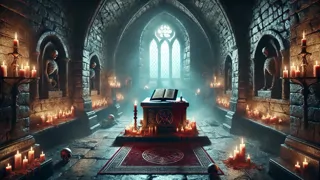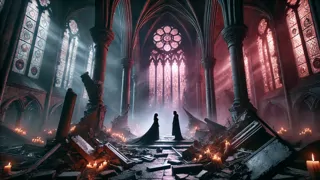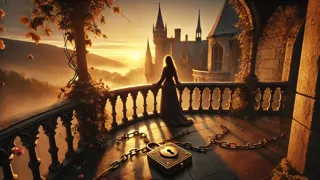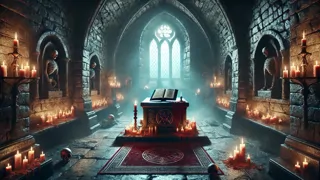Introduction
On a wind-swept ridge in upstate New York stood Ravenhold Manor, its gothic spires laced with ivy and shadow. Under clouds that seemed to brood like living things, its stone walls bore silent witness to decades of misfortune and faded glory. Inside, Eleanor Hawthorne paced the grand hall in a silken gown of midnight blue, every step echoing against cold marble. She clutched an antique locket—an heirloom said to carry the key to her family’s salvation or ruin. Beyond the tall, arched windows, lightning flashed, illuminating the statues of gargoyles perched on the turrets, watching and waiting.
Eleanor’s father, once a respectable industrialist, had gambled everything on fortunes that never came. Her mother lay bedridden, wasting beneath feverish dreams of blood and whispered prophecies. The Hawthorne name had become a byword for tragedy, fortunes lost, and debts unpaid. Now, the last creditor’s writs crowded the foyer like vultures circling carrion. Eleanor knew her family faced ruin by dawn. Driven by desperation, she had delved into forbidden lore, tracing rumour and myth until one name stood above all others: Berekus, the ancient vampire lord whose hunger for blood was matched only by his lust for dominion.
Under the flicker of candlelight in the manor’s hidden crypt, she recited incantations she barely understood. Stone walls glistened with moisture as the air grew cold and still. A figure emerged from shadows—tall, pale, with eyes like molten silver. His presence drained warmth from the chamber, and Eleanor steeled herself against the fear that threatened to overwhelm her. Berekus spoke in a voice both velvet-soft and razor-sharp: he would grant her power, restore her family’s fortunes, and cure her mother—if she would offer him blood in return. Not a token, but a steady flow.
Eleanor hesitated. Every fibre of her being rebelled at the thought of offering human life. Yet what choice did she have? Stepping forward, she pressed a quivering palm to the lord’s respite, feeling the cold edge of his vampiric fangs. The first drop kissed her skin. In an instant, the manor trembled, and the candle flames shuddered. A whisper in the air spoke of chains long broken and curses anew. Eleanor fell to her knees, the price paid—but at the threshold of the pact, a darker truth loomed: what if this bargain did more than restore? What if it awakened a curse older and more terrible than any debt?
Thus began the night that would determine the fate of Ravenhold, of the Hawthorne line, and perhaps of the world itself. Blood had been offered, and power answered—but at what cost?
The Blood Debt
Eleanor awoke in a haze of crimson light. The crypt’s candles had burned low, and Berekus was gone, but the scent of iron and magic hung thick in the air. She fled up narrow staircases, past corridors whose tapestries whispered of long-dead ancestors, each portrait seeming to watch her with hollow eyes. In the library, she found her mother asleep in a high-backed chair, pale as marble but breathing steadily. Across the table lay gold coins, deeds signed, and letters of clearance—proof that the Hawthorne debts were erased. Relief nearly brought Eleanor to tears, but beneath triumph stirred dread.

By day’s light, Ravenhold resumed its dusty calm, as though nothing had changed. Yet at breakfast, Eleanor noticed the staff’s hollow eyes—servants moved with an unnatural grace, their smiles too fixed. Their loyalty had always been steadfast, but now it felt enforced. When she inquired, they spoke of strange visitors sweeping in by carriage—hunters in dark cloaks, drawn by rumors of power, seeking audience with their master. Rumors of blood magic had spread beyond these hills, and where Berekus walked, peril followed.
That evening, Eleanor ventured through candlelit halls to the sunroom, where inland fog pressed against stained-glass windows. The locket she wore pulsed at her chest, a heartbeat that was not her own. Suddenly, she felt a shift—something ancient stirring beneath the stone floors. She found herself at the crypt entrance, compelled as if by unseen force, drawn to the darkness she had once braved. There, at the altar, a book lay open: pages inscribed in blood and silver. It told of the Curse of Ravenhold, an old family bane linked to the Hawthorne pact with darkness incarnate. According to faded script, the pact would bind the family’s souls to the castle unless a true sacrifice of compassion could nullify it.
Eleanor realized the bargain was incomplete. Berekus had taken blood, yes—but the curse thirsted for remorse and redemptive suffering. She needed to confront the vampire lord again, to force him to face the humanity he’d long abandoned. But he vanished as dawn broke—and with his departure, an unnatural chill overtook the manor. Lights flickered, locks clicked, and the servants fell into uneasy sleep, cursed to dream of blood-soaked altars. As she searched for Berekus, Eleanor uncovered hidden passages behind library shelves and crypt walls, leading deeper into the earth than she dared go. There, voices whispered and bones lay scattered, remnants of past rituals. She pressed on, determined to break the cycle before the next blood debt was demanded.
(Additional content continues, weaving alliances with skeptical hunters, confrontations in moonlit courtyards, and the unveiling of Berekus’s tragic origin—stretching the chapter to reveal hidden truths and mounting tension.)
Shadows of the Past
Under the moon’s argent glow, Eleanor joined forces with Gabriel Thorne, a hunter whose family had once suffered at Berekus’s hand. Their uneasy alliance sparked tension and reluctant trust. Through midnight pursuits across fog-bound courtyards, they traced the vampire’s path from Ravenhold’s crypts to abandoned family estates. Each location bore scars—drained corpses, wilted gardens, shattered glass. They uncovered letters between Berekus and an ancestor of Eleanor’s, confirming that the first bargain was meant to be temporary, sealed by an act of true redemption that never occurred.

As they delved deeper, Berekus’s presence loomed like a storm. Shadows coalesced and retreated; whispers of longing and rage flickered through the walls. Eleanor confronted him in the old chapel, its stained glass fractured, colored shards glinting in candlelight. She demanded the final terms of the pact: what was required to free her family forever? Berekus revealed the curse’s cruel twist—only a life not bound by blood could break the chain. He offered his own, urging her to stake him through the heart. In that instant, he would die a mortal death and release those bound. Yet even as remorse touched him, his centuries of hunger warred against the plea. Eleanor hesitated, torn between mercy and duty.
Outside, a mob of bloodthirsty mercenaries descended on the castle, tipped off by rumors of vampire’s gold. Arrows whistled through broken windows, flames licked at ancient tapestries, and servants turned upon one another in vampiric frenzy. In the chaos, Gabriel protected Eleanor, striking down the infected, while she faced Berekus amid falling rubble. Their eyes met—vampire and human—each searching for salvation. The final confrontation hinged on her choice: complete the mortal blow, or risk the vampire’s wrath in seeking another path.
(The chapter expands to include desperate escapes, moral dilemmas, and the shattering of long-held illusions, building to an epic climax where mercy and justice collide.)
Redemption’s Dawn
Dawn’s first light bled into the sky as Eleanor raised the stake, hands trembling. Berekus knelt, accepting the blow, his silver hair fanned across the shattered marble floor. At that moment, she paused, recalling every word of the ancient text. The curse would lift only if he chose mortality willingly, but compassion required a willing sacrifice. With tears, she spoke: “Kill me first.” Shock rippled through the air as Gabriel advanced, ready to stop her. Yet Eleanor stood firm, heart pounding. Berekus looked up, understanding at last what freedom truly meant.

He placed his cold hands on her shoulders. “My life for yours,” he whispered. In a heartbeat, he drove the stake through his own chest. Light exploded, and a scream unlike any mortal cry echoed through the halls. The curse unraveled like thread in fire, the blood debt erased. Ravenhold Manor trembled, then fell silent. When Eleanor opened her eyes, the crypt was empty—no body remained, only ash on the altar.
Aboveground, the first rays of sun reached the manor’s towers, painting them gold. The staff emerged from their slumber, free of the pall of darkness. Gabriel stood beside Eleanor on the terrace, the morning air crisp and new. The locket lay broken at her feet, its magic spent but its promise fulfilled. Ravenhold’s future glowed with possibility at last, unburdened by ancestral sin.
In the weeks that followed, Eleanor restored the estate and revived her mother’s health. She recorded the true story of the vampire lord’s redemption, ensuring the world would remember Berekus not as a monster, but as the sacrifice that saved Ravenhold. And when night fell, the manor stood serene—its shadows no longer hungry, but at peace.
(The chapter closes with reflections on love, sacrifice, and the enduring power of mercy, leaving readers with a sense of hope and renewal.)
Conclusion
The story of Vampire’s Castle endures as a testament to choices made in darkness and the light they can bring. Eleanor’s courage to face a creature of the night, to recognize the humanity within him, became the keystone of redemption. She proved that true power lies not in the spilling of blood, but in the willingness to sacrifice oneself for the greater good. As word of Ravenhold’s miraculous transformation spread, wanderers and scholars alike came to marvel at the manor reborn—no longer a place of dread, but a beacon of compassion’s triumph.
Though the halls still echo with memory, they carry the laughter of children and the warmth of life renewed. Gabriel Thorne took his place as protector, and together with Eleanor, they guarded the legacy of mercy she etched into history. In the end, the curse that bound the Hawthorne line dissolved into myth, a cautionary tale of power unchecked. But more than that, it became a story of hope: that even in humanity’s darkest hour, a single act of kindness can shatter chains as unbreakable as death itself. And thus, Vampire’s Castle stands forever as proof that redemption is possible—even for those who walk in shadows.
From the ash of ancient bargains, a new dawn rose—and with it, the promise that no curse can stand against the light of a willing heart.


















